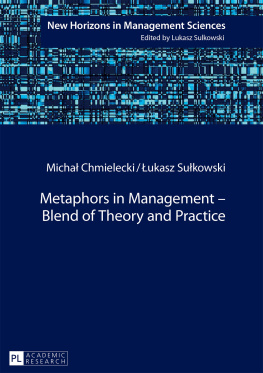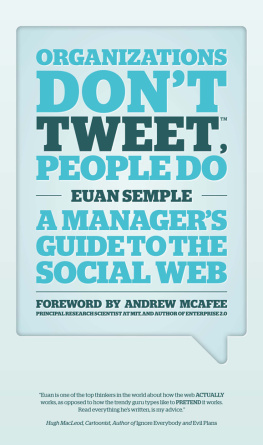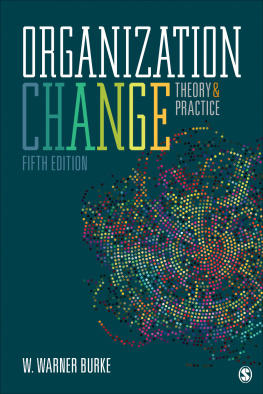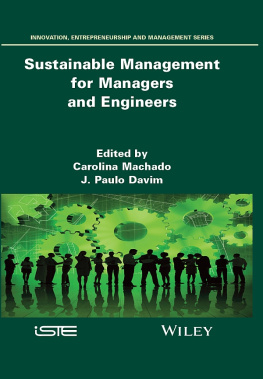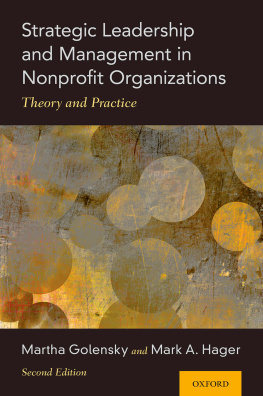New Horizons in Management Sciences
Edited by Lukasz Sulkowski
Scientific Board: Prof. Dr. German Chavez
Prof. Dr. Marcela Rebeca Contreras Loera
Prof. Dr. hab. Natalia Czuchraj
Prof. Dr. Geoff Goldman
Prof. Dr. hab. Barbara Kozuch
Prof. Dr. Claude Martin
Prof. Dr. Thomas P. Massey
Prof. Dr. hab. Bogdan Nogalski
Prof. Dr. hab. Roman Patora
Prof. Dr. Americo Salvidar
Prof. Dr. hab. Kazimierz Zimniewicz
Volume 5

Micha Chmielecki / ukasz Sukowski
Metaphors in Management Blend of Theory and Practice

Bibliographic Information published by the Deutsche Nationalbibliothek
The Deutsche Nationalbibliothek lists this publication in the DeutscheNationalbibliografie; detailed bibliographic data is available in the internet at http://dnb.d-nb.de.
This publication was financially supported by the grant from University of Social Sciences.
ISSN 2194-153X
ISBN 978-3-631-71611-3 (Print)
E-ISBN 978-3-631-71612-0 (E-PDF)
E-ISBN 978-3-631-71613-7 (EPUB)
E-ISBN 978-3-631-71614-4 (MOBI)
DOI 10.3726/b10714
Peter Lang GmbH
Internationaler Verlag der Wissenschaften
Frankfurt am Main 2017
All rights reserved.
PL Academic Research is an Imprint of Peter Lang GmbH.
Peter Lang Frankfurt am Main Bern Bruxelles New York Oxford Warszawa Wien
All parts of this publication are protected by copyright. Any utilisation outside the strict limits of the copyright law, without the permission of the publisher, is forbidden and liable to prosecution. This applies in particular to reproductions, translations, microfilming, and storage and processing in electronic retrieval systems.
This publication has been peer reviewed
www.peterlang.com
6 | 7
All theories of organization and management are based on implicit images or metaphors that persuade us to see, understand, and imagine situations in partial ways. Metaphors create insight. But they also distort. They have strengths. But they also have limitations. In creating ways of seeing, they create ways of not seeing. Hence there can be no single theory or metaphor that gives an all-purpose point of view. There can be no correct theory for structuring everything we do.
It has always been the goal of managing bodies to understand their employees intentions, and try to predict their behavior in an organizational context states that metaphors assist companies in analyzing organizations from a mosaic of different lenses or images.
Bennis and Nanus. By studying metaphors, the modern-day manager will be better prepared to understand organizations and how best to deal with the circumstances they are challenged by, as they strive for results.
Metaphors saturate our language
Table 1. Findings on the frequency of use of metaphor, by different authors.
| Author(s) | Frequency in metaphor |
| Steen et al. | 13.6% of all lexical units in the corpus can be classified as being related to metaphor. |
| Gibbs | 5.7 metaphors per minute of speech. |
| Whalen et al. | 3.69 nonliteral statements in past-oriented e-mails (average of 284,90 words) and 2.11 in future-oriented e-mails (average of 221,02 words). |
| Andriessen | At least 95% of all statements about either knowledge or intellectual capital are based on metaphor. |
Source: J. Wittink, RELIABLE METAPHOR ANALYSIS IN ORGANIZATIONAL RESEARCH, Towards a dual, dynamic approach, VU University Amsterdam, http://dspace.ubvu.vu.nl/.
They are often used to understand evasive concepts that we would like to communicate with others. Morgan wrote that metaphor is a primal, generative process that is fundamental to the creation of human understanding and meaning in all aspects of life.
We instinctively graft abstract and complex concepts such as time, life and organization onto more concrete concepts that are easier to visualize. Even theories get visualized, often as structures (we may talk about supporting evidence or the foundations of a theory). Metaphors are omnipresent in science. Astrophysicists describe the distribution of mass in the universe as being foam-like, 9 | 10 .
Phrases such as life is a game or business is war clearly represent expressions by means of which the speaker aims to draw the recipients attention to the fact that in life or business, you can either win or lose.
Metaphors have remained an important subject of interest through the centuries. Theory, analysis, research and study have been dedicated to them, from Aristotle until now. Conflicting with common thought, our conceptualization and thinking are pervaded by metaphors, rather than their simply serving as rhetorical and poetic devices. To be more precise, in the field of linguistics and communication it is believed that our cognitive processes and thoughts are highly metaphorical that human thought is constructed and constituted of metaphors.
Metaphors are basically implied comparisons that bring together two concepts. Metaphor occurs when a unit of discourse is used to refer unconventionally to an object, process or concept, or colligates in an unconventional way. And when this unconventional act of reference or colligation is understood on the basis of similarity, matching or analogy involving the conventional referent or colligates of the unit and the actual unconventional referent or colligates.
We must also stress that metaphors evolve. For instance, until very recently the information superhighway was a metaphor for the internet. But the word cyberspace has now taken over. The question is whether they are the same. Alternatively, will a new word replace the term cyberspace as wearable computers cross over from the realm of the exotic to that of mass-produced commodity?
Among various types of metaphors emerging from professional literature, several that are used more frequently in management can be identified. These are presented in table 1.
Table 2. Metaphor types.
| Type of metaphor | Description |
| cognitive metaphor | 1. A cognitive metaphor associates the object with an experience outside of the object for cognitive purposes, and is the fundamental type of metaphor. |
| core metaphor | 2. A core metaphor, which constitutes a fundamental method of interpretation, is used in management with reference to understanding of the organizational culture as being the organization itself. |
| extended metaphor | 3. An extended metaphor allows for development of one interpretational plot. If it is assumed that the organization is a theatre, then their participants may be perceived as actors, strategic options as different scripts, and organizational cultures as acting styles, etc. 11 | 12 |
| mixed metaphor | 4. A mixed metaphor is one that leaps from one comparison to another, causing surprise or a paradoxical feeling. In an organizational discourse, such roles are assigned to the postmodern use of a variety of conflicting metaphors (e.g. an organization is a kaleidoscope which transformed into a happening once the machine collapsed). |
| absolute metaphor | 5. An absolute metaphor is a linguistically non-reducible concept. A prerequisite for use of these kinds of metaphors is the ambiguity and the problem with reductionism of the basic notions of our sciences, such as organization, management, strategy, structure, culture, etc. |

